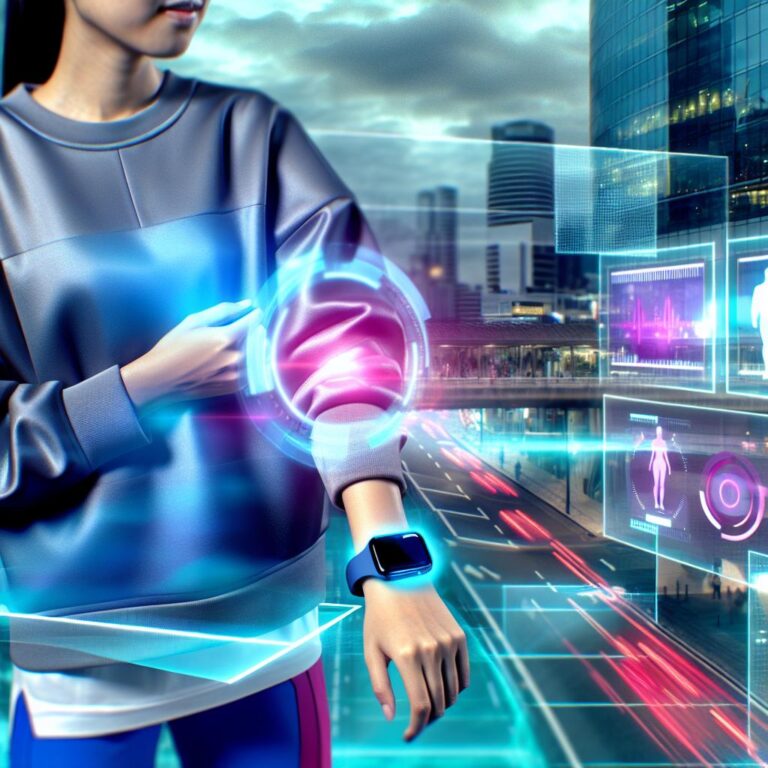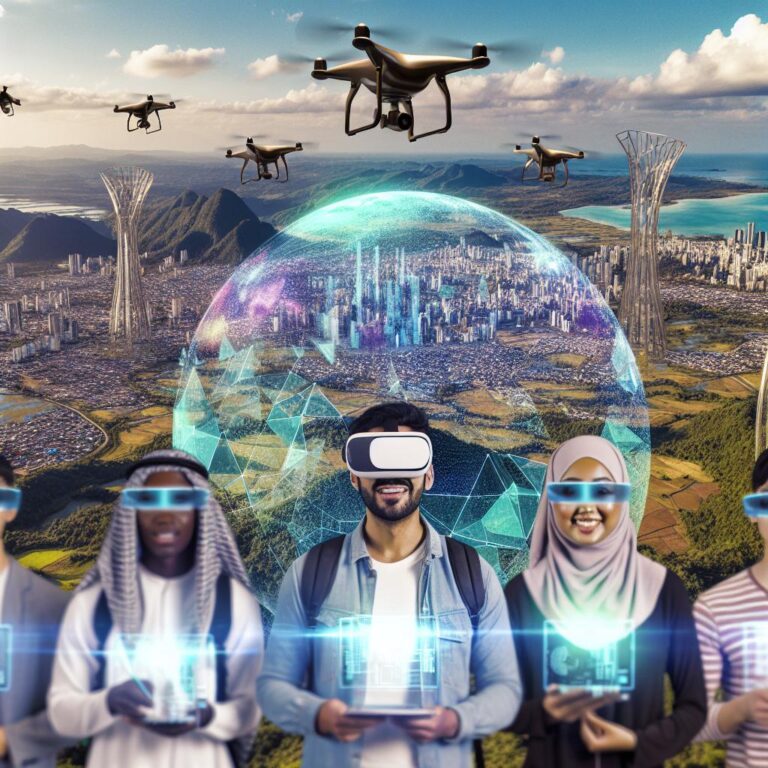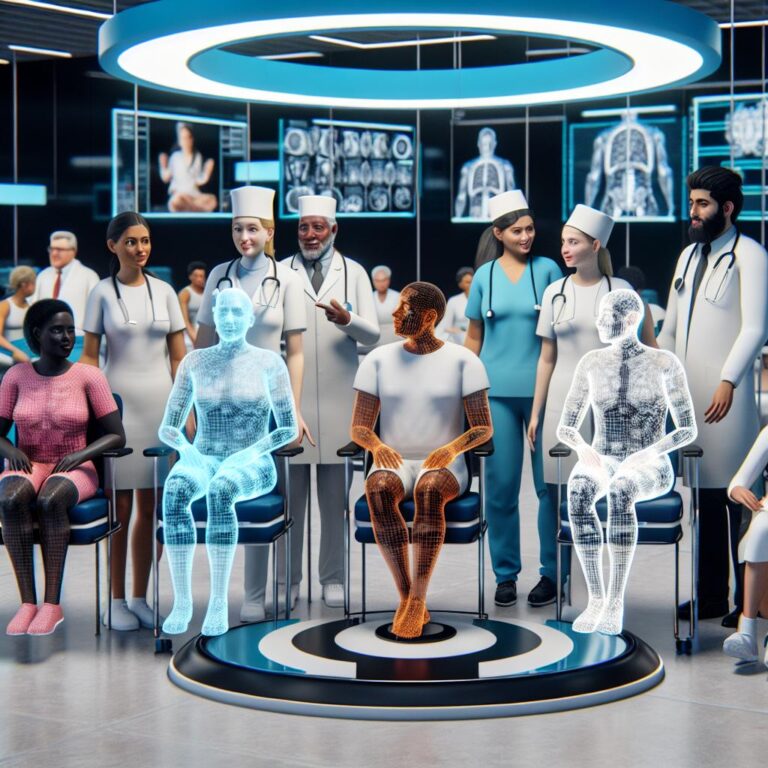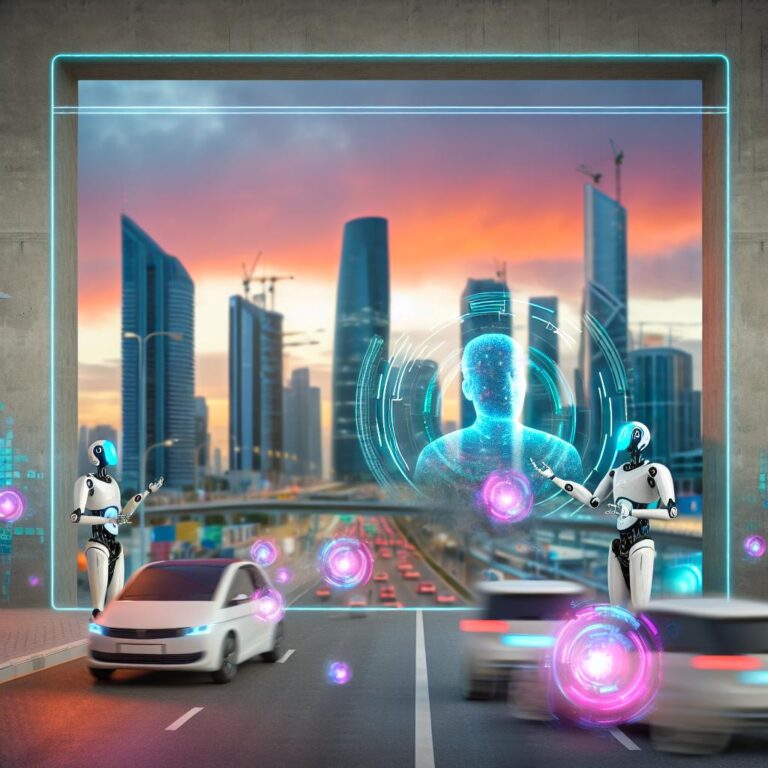
- AI is revolutionizing healthcare with major contributions in diagnostics, treatment personalization, and patient engagement.
- Key technologies include machine learning for data analysis and natural language processing for understanding clinical notes.
- AI improves diagnostic accuracy and treatment efficiency, aiding in quicker and more accurate patient care.
- Market value of healthcare AI is expected to grow from $11 billion in 2021 to $187 billion by 2030.
- AI applications enhance medical imaging, precision medicine, and streamline healthcare administration.
- Challenges include ethical issues like bias, integration difficulties, and data privacy concerns.
- AI in healthcare faces hurdles in ensuring responsible use but shows promise for improved accessibility and quality.
- Future trends focus on precision treatments, real-time health monitoring, and transforming healthcare delivery systems.
Did you know AI is changing healthcare in exciting ways? I’m talking about game-changing breakthroughs that could reshape how we understand and access medical care. From enhancing diagnostics to optimizing treatments, AI is stepping up to the plate with surprising and impressive solutions. Join me as we dive into how these smart technologies are making waves in the world of healthcare, improving lives, and setting the stage for a revolutionary future.
How is AI Currently Being Implemented in Healthcare Services?
Artificial intelligence (AI) is doing big things in healthcare today. Let’s explore how AI is helping our doctors and nurses. Since IBM’s Watson AI system’s healthcare launch in 2011, we’ve seen huge changes. Tech giants like Apple, Microsoft, and Amazon are leading the way. These companies are building amazing AI tools to help doctors serve patients better and faster.
What are the Key AI Technologies Facilitating Change in Healthcare?
AI technology is more than just a fancy term. The key AI technologies driving healthcare change include machine learning and natural language processing (NLP). Machine learning helps by studying clinical data deeply. It spots patterns that humans might miss. This lets it predict medical outcomes and suggest the best treatments.
NLP helps computers understand and use our language. In healthcare, it reads doctors’ notes and patient records. By doing so, it finds health markers and tracks patient progress. It’s like a helpful detective that finds clues others might miss.
As these [AI advancements in healthcare](https://pubmed.ncbi.nlm.nih.gov/?term=Kalakota R[Author]) continue growing, we’re expecting the healthcare AI market to explode. It’s valued at $11 billion in 2021 and is expected to reach a whopping $187 billion by 2030. This growth means more and better AI tools for patient care.
How do AI Applications Benefit Diagnostic and Treatment Processes?
AI is making waves in how doctors diagnose and treat patients. Some might ask: How does AI help in these processes? It makes diagnosis faster and more accurate. It looks at tons of data and helps doctors figure out diseases quickly. This means they can start treatment earlier.
AI not only assists in diagnosis but also in treatment plans. It examines records and suggests treatments that fit each patient best. Doctors can rely on AI to consider options that might not come to mind. In the end, patients receive more focused care.
AI tools, like computer-aided imaging, help many medical fields. It looks at scans and images with super-precision. For example, spotting a tiny tumor that the human eye might overlook becomes possible with AI. It gives doctors a second, very reliable opinion.
In What Ways is AI Optimizing Patient Engagement and Adherence?
AI has a crucial role in helping patients stay engaged with their healthcare. It’s not just about the doctor’s work; patients need support too. AI-driven applications remind patients to take medicine or show up for appointments. This means fewer missed treatments and better health outcomes.
Another frequent query is: How does AI encourage patients to keep up with their treatments? AI systems send reminders via apps or texts, encouraging patients to stay on track. They offer information in an easy way, so patients understand their treatment plans better.
Furthermore, AI systems analyze patient data to personalize health tips and advice. Patients receive custom notifications guiding them on their health journey. They feel more informed and involved in managing their care.
AI also helps doctors by managing patient feedback. These systems gather and sort through patient comments and reviews. By doing so, they help doctors improve their services. It’s like having an assistant that listens and learns from each patient’s story.
In sum, AI is transforming healthcare by improving diagnostic accuracy and treatment personalization. By leveraging data and smart tools, AI makes patient care more efficient and effective. The future of AI in healthcare is bright, promising continued improvements in patient engagement and health outcomes.
What are the innovative applications of AI in healthcare?
Artificial intelligence, or AI, is changing healthcare in huge ways. Let’s dive into some fascinating applications that show how AI is helping both doctors and patients.
How is AI enhancing medical imaging and diagnostics?
AI is making strides in medical imaging. It looks at images from X-rays and MRIs and finds problems much faster. So, AI can spot a tumor or a broken bone quickly. Being fast here means quicker care for patients.
Doctors use AI to scan large sets of images. The AI algorithm helps to draw patterns and important details. This helps find things a human eye might miss. Imagine having a second set of eyes that sees more than ever before.
Besides spotting problems, AI can predict outcomes too. Algorithms can determine how likely a condition might worsen. If a person has a lung infection, AI predicts if it might get worse. This way, doctors know whom to treat first.
With AI-driven diagnostics, we’re not just faster but also more precise. It’s like having a smart assistant that never tires.
What role does AI play in precision medicine and drug discovery?
AI is a key player in making treatments personal. This is what we call precision medicine. Instead of a one-size-fits-all, doctors can tailor treatments. AI looks at a person’s genes, habits, and health records. It then helps choose a medicine that works best for them.
When it comes to finding drugs, AI accelerates the process. Normally, testing a drug takes a long time. AI predicts which compounds might work against a disease. This speeds up the journey from lab to pharmacy.
AI models help in understanding how a disease affects different bodies. They simulate various scenarios. Thus, better and safer treatments become available much quicker.
Thanks to AI, doctors can make better choices. Precision medicine leads to fewer side effects and better results. Patients get the care they need and deserve.
How is AI being used to improve healthcare administration?
Healthcare administration often involves too much paperwork. AI steps in to handle these tasks. This means doctors and nurses can focus more on patients.
Billing, scheduling, and updating records can be time-consuming. AI automates these processes, reducing errors and saving time. Think of it as having an efficient clerk who never makes a mistake.
AI also helps in predicting patient demand. Hospitals use AI to foresee how many beds might be needed. This ensures resources are available when needed.
For instance, if flu season is around the corner, AI forecasts a spike in cases. Hospitals can prepare staff and supplies accordingly. This proactive approach improves service and saves lives.
AI-driven systems ensure the smooth running of operations. They improve how resources are used, cutting costs and waiting times.
In conclusion, AI applications in healthcare are diverse and growing. From diagnostics to administration, AI is transforming lives, simplifying tasks, and making processes more efficient. We might not notice it every day, but AI is there, making big strides in how we think about health.
What are the major challenges and ethical considerations with AI in healthcare?
AI is making big changes in healthcare. Yet, with good things come problems. When I look at AI in healthcare, I see many challenges.
What ethical concerns arise from AI use in healthcare systems?
AI can do things that seem almost like magic, which is exciting. But it also brings big questions. One big ethical concern is bias. How could AI show bias in healthcare? AI learns from data, and if that data has bias, AI will too. For example, if an AI tool is trained mostly on data from one group, it might not work well for others. This can lead to unfair treatment in healthcare.
Another concern is decision-making. How should we make sure AI makes safe choices in healthcare? AI can help doctors decide, but it cannot feel or think like humans. AI lacks empathy, which is crucial when making sensitive health decisions. While AI can suggest a treatment, the final decision should always be human. We can’t trust machines with life-altering choices alone.
Errors in AI predictions also raise ethical issues. What happens if AI makes a mistake? If AI misdiagnoses or suggests the wrong treatment, the patient’s health might be at risk. It’s still unclear how we handle mistakes made by machines. Who is responsible? This is tricky and needs careful thought.
How can healthcare providers address AI integration challenges?
Integrating AI into hospitals or clinics is not easy. Many obstacles need clear solutions. Why is AI integration challenging in healthcare? One big challenge is fitting AI tools into existing systems. Hospitals have electronic health records (EHRs), but these are not always ready for AI upgrades. Coordination between EHR systems and AI tools is vital. Without smooth integration, AI cannot work well.
How do we train staff to work with AI? Healthcare providers must learn about new AI tools. Yet, busy schedules make training difficult. Training programs need to be clear and simple so healthcare workers can use AI tools confidently.
AI also needs access to complete data. Why is data quality important for AI? AI relies on data to make predictions. If data is incomplete or wrong, AI decisions might be poor. Thus, getting high-quality and full data is necessary for AI to succeed.
Furthermore, healthcare providers often feel uneasy about AI. How do we build trust in AI systems? Trust must be earned. Transparent AI models where providers can see why AI made a certain decision can help build trust. Regular updates and easy understanding of AI processes are key steps forward.
What are the implications of AI for data privacy and security?
Data in healthcare is very important and personal. So, how can AI ensure data privacy? Everybody must handle AI data with extreme care. Patient records hold sensitive details about health. Leaking this data is a constant fear. Robust security measures that guard data at all stages are essential to prevent breaches.
AI involves data sharing between systems. What risks does data sharing entail? When data moves across systems, it becomes vulnerable to attacks. Steps like encryption are vital to protect this data. Data should remain secure as it travels between AI programs and storage.
We also consider consent. What is the role of consent in data use? Patients need to understand how their data is used. It’s important they feel secure about sharing information. Healthcare providers must explain clearly how patient data will help improve healthcare with AI.
And then, there’s the global nature of AI data. How does international data transfer impact privacy? Healthcare providers sometimes share data across borders. Different countries have different laws. This can cause confusion and risk. It’s crucial to align international regulations. Countries must work together for uniform rules.
When I think about all this, I feel both hopeful and cautious about AI in healthcare. Finding the balance between using AI’s power and addressing ethical and technical challenges is key. The ethical implications of AI in medicine are complex, needing careful thought. As AI grows, solutions must be clear, so everyone benefits without losing trust or safety.
What does the future hold for AI in the healthcare industry?
What emerging trends are shaping the future of AI in healthcare?
AI is becoming key in the future of healthcare. One major trend is machine learning. Machine learning manages huge amounts of health data. It spots patterns that help doctors in diagnosis. These patterns lead to more precise and personalized treatments. For example, AI looks at patient data to suggest treatments based on their history.
Another notable trend is natural language processing, or NLP. NLP helps doctors by turning written notes into useful data. Algorithms extract information that assists in diagnosis and treatment. This helps doctors make quick, informed decisions. AI systems even translate instructions into different languages, removing language barriers.
We also see growth in using AI for health monitoring. Wearable devices and mobile apps track vital signs and send alerts for any changes. This real-time monitoring supports early intervention. People take charge of their own health, avoiding severe health issues.
How is AI expected to transform healthcare accessibility and quality?
AI has the power to make healthcare more accessible and improve its quality. It does this through telemedicine and online consultations. These services are much easier with AI-driven systems. Patients in remote areas can connect with doctors without traveling.
AI could also reduce waiting times at clinics. AI systems handle appointment bookings based on urgency. This technology ensures that patients with more critical needs get fast attention.
For quality care, AI supports personalized medicine. By studying patient data, AI designs treatments unique to each person. This precision medicine offers better outcomes compared to one-size-fits-all treatments.
AI aids in predicting disease outbreaks. Its ability to process global health data allows early detection of pandemic threats. These predictions ensure quicker responses from health organizations.
What are the potential long-term impacts of AI on healthcare delivery?
In the long run, AI will change how healthcare is delivered. By 2030, the AI healthcare market might grow to $187 billion. This indicates a massive shift in how medical services operate. AI’s role in decision-making reduces human error. This certainty boosts patient trust in medical systems.
AI also lessens everyday tasks medical staff face. Automated systems handle paperwork and data input, allowing doctors to focus more on patients. Streamlining these tasks improves efficiency and job satisfaction.
Enhanced data management through AI opens new research avenues. It provides insights, which fuel innovation in medicine. The way new drugs and treatments are developed will evolve rapidly. AI can uncover relations that remain invisible to humans.
AI’s role in robotic surgery is another promising field. Robotic systems offer precision that surpasses traditional hands. They perform intricate procedures with unmatched accuracy, lessening recovery time for patients.
In conclusion, AI leads to bold changes in healthcare. While its role grows, we must address ethical and integration hurdles. These obstacles are vital to ensuring AI’s success in saving lives and improving healthcare systems. AI in healthcare will redefine medicine’s future paths, creating better healthcare for everyone.
Conclusion
AI in healthcare is groundbreaking. It improves diagnostics, treatments, and patient care. It tackles imaging, precision medicine, and even healthcare management. Yet, we face ethical challenges and privacy concerns. We must address these to ensure beneficial AI adoption. The future looks exciting with AI advancing healthcare accessibility and quality. Understanding these elements empowers us to embrace AI’s potential for better health outcomes. Stay engaged, informed, and ready for the future shifts AI brings to medicine. Together, we can navigate these advancements for improved healthcare experiences.






